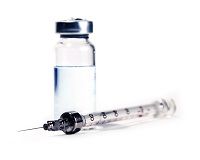Longer Lasting Version of Schizophrenia Drug Approved
The US Food and Drug Administration today approved 3-month paliperidone palmitate (Invega Trinza/Janssen) a longer-lasting version of Janssen's paliperidone palmitate product marketed as Invega Sustenna, a treatment that works for only 1 month per injection.

Adult patients with schizophrenia will soon have access to an injectable medication that is meant to be given only 4 times a year.
The US Food and Drug Administration today approved 3-month paliperidone palmitate (Invega Trinza/Janssen) a longer-lasting version of Janssen’s paliperidone palmitate product marketed as Invega Sustenna, a treatment that works for only 1 month per injection.
The company expects the newer drug to be available in mid-June, 2015.
The results of a long-term maintenance trial in which 93% of patients treated with the 3-month paliperidone palmitate got significant relief from symptoms were published in March in JAMA Psychiatry.
The longer lasting version uses a patented technology which enables solubility of poorly water-soluble compounds.
The FDA evaluated the trial results under a priority review designation granted in January 2015, just three months afterJanssen initially submitted its new drug application for the product.
Before starting Invega Trinza, patients must be adequately treated with Invega Sustenna for at least 4 months.
“With a dosing interval that can be measured in seasons, not days, people living with schizophrenia and their treatment teams can focus on recovery goals beyond short-term symptom control,” said Invega Trinza trial investigator Joseph Kwentus, MD, in a Janssen news release. “Recovery looks different for everyone, and the long-term symptom control offered by Invega Trinza can help patients work toward their own personal goals.”
The FDA was satisfied that the longer-lasting drug had the same safety profile as the 1-month version.
In its release, Janssen quoted a mental health advocate, Paul Gionfriddo. “As both an advocate and a parent of an adult son with schizophrenia, I can attest to the importance of novel therapies that enable our loved ones to spend more time focusing on their recovery and less time worrying about taking medications,” he said.